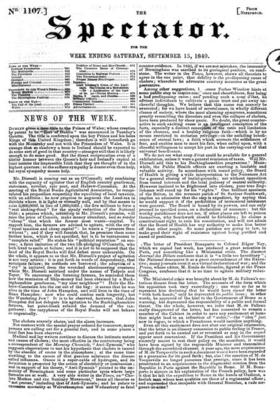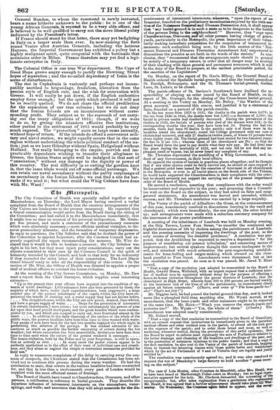. The letter of President Bonaparte to Colonel Edgar Ney,
which we copied last week, has produced a great sensation in Paris, and something like a Ministerial crisis. The discreet Journal des Debats confesses that it is "a little too hereditary " ; the National denounces it as a great encroachment of the Execu- tive; many journals treat it as a virtual declaration of war ; and the Presse, whose editor, M. Emile de Girardin, figured at the Peace Congress, confesses that it is no time to agitate military reduc- tions.
The Ministerial crisis was brought about by M. de Fallout's no- torious dissent from heletter. The accounts of the form which his opposition took vary exceedingly : one went so far as to represent him declaring that he would have signed the letter "with both hands," only he deprecated its public issue • in other words, he approved of the hint to the Government of issue; as a warning' but deprecated the responsibility of a public and formal threat. On the whole however' we infer that M. de Falloux really disapproved of the letter, but has consented to remain a member of the Cabinet in order to save any excitement at home that might lead to an infraction of " order, '—the "idea" just now in vogue, to which a Frenchman would sacrifice anything. Even all this excitement does not alter our original impression, that the letter is an illusory concession to public feeling in France, and put forth to be carried out or retracted as may in the segue/ appear most convenient. If the President and his Government sincerely meant to rest their policy on the manifesto, it would have been signed by the responsible Minister and transmitted through the accredited channel. A year ago, the mere acquiescence of M. de Tocqueville in such a document would have been regarded' as a guarantee for its good faith ; bit, alas ! the sanction of M. de Tocqueville no longer possesses that prestige, since it has been prostituted to an acquiescence in the disgraceful mission from the Republic in Paris against the Republic in Rome. If M. Bona- parte is sincere in his eiplanation of the French policy, how was it that he left the expedition to Rome in the hands of Oudinot, a foolish OWI, law les qualities are those of a regimental officer; and auperandod thatineapable with General Roatolan, a rude sex. geant-at-*,s?
General Randon, to whom the command is newly intrusted, bears a name hitherto unknown to. the public : he is one of the young African Generals, is,reputed.- to be a-very able officer, end is believed to be well qualified to carry- out the more liberal policy indicated by the Presidents letter.
If France should stand by that letter, there may yet befighting in Italy on a larger scale than ever. In new-naming the forts round Venice after Austrian Generals, including the heinous Haynau, the Imperial Government has exhibited a paltry but a highly malignant spirit, quite congenial with the bastinado that maintains order in Milan. France therefore may yet find a legi- timate enterprise in Italy.



























